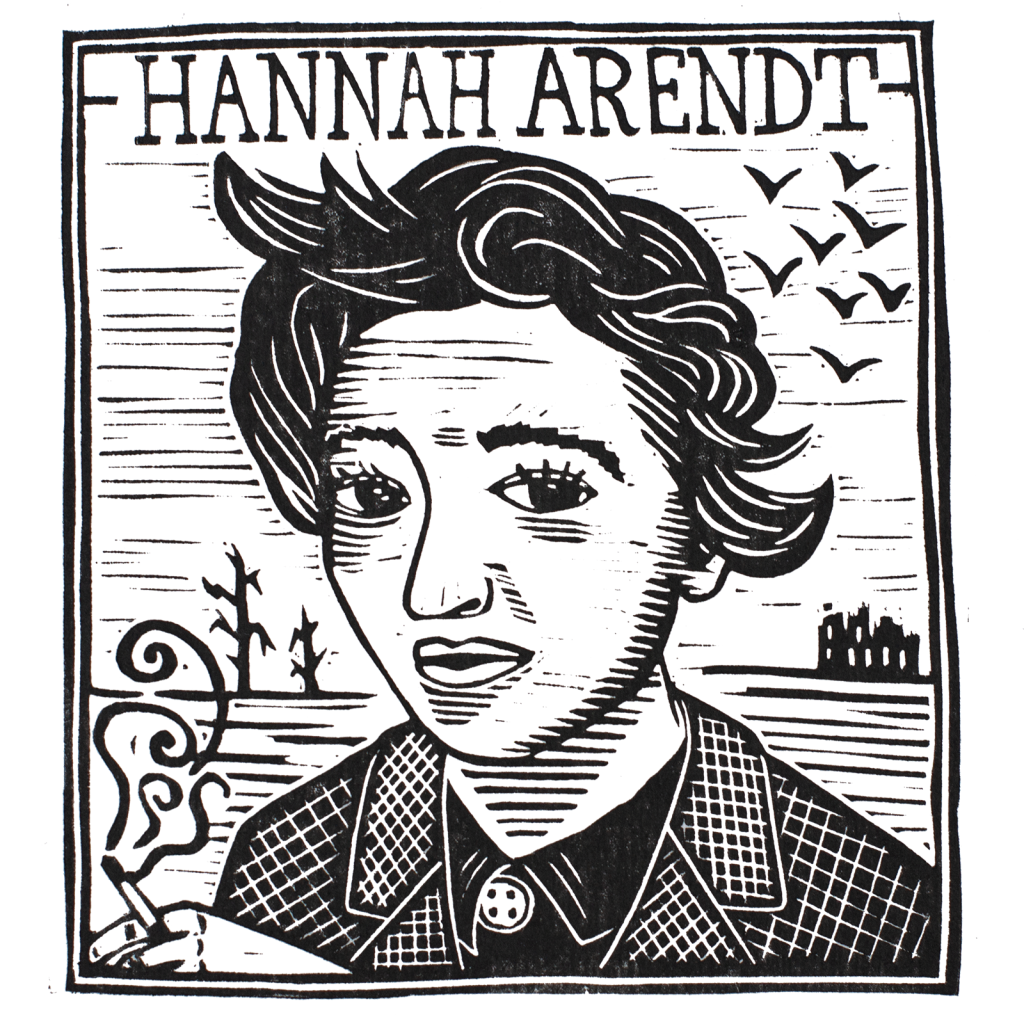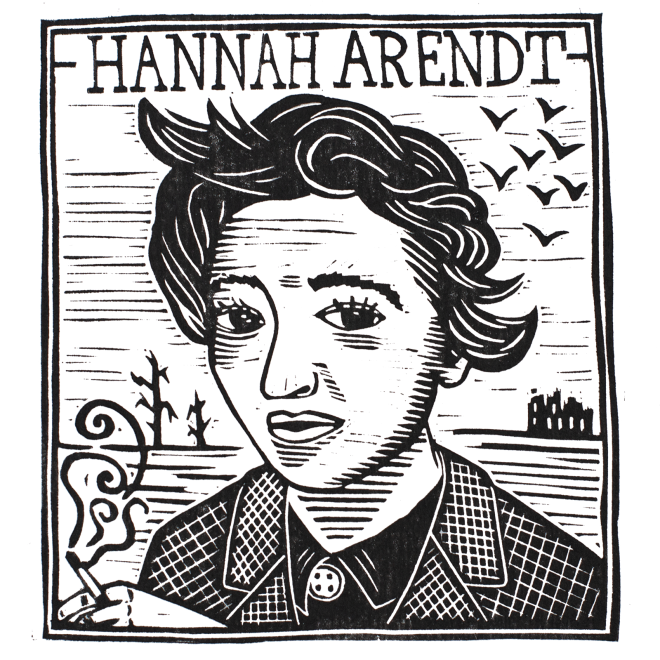Hannah Arendt was a German-American philosopher and political theorist. In her many books and articles, she deals with the concepts of power, politics, totalitarianism, democracy, and more. She is widely considered one of the most influential political philosophers of the twentieth century.
“The sad truth is that most evil is done by people who never make up their minds to be good or evil.”
Hannah Arendt, The Life of the Mind
Growing up Jewish in Germany during the early 20th century, her life and work were unsurprisingly significantly impacted by the rise of antisemitism and the Second World War. In one of her most famous works, covering the trials of Adolf Eichmann, she suggests that humanity is capable of evil through the mundane. Evil is possible through those who do not choose between good and evil and simply follow orders in totalitarian systems. Instead of deeming Nazis monsters, she took on humanity itself. When she saw Eichmann she was struck by his lack of interest in good or evil, he was a boring bureaucrat. She called it “the banality of evil”. As with all revolutionary ideas, this was a controversial one.
Another work, The Origins of Totalitarianism, looms large in her intellectual legacy. In it, she looks at two major European totalitarian movements of her lifetime: Nazism and Stalinism. She sees totalitarianism as a “novel form of government,” that “differs essentially from other forms of political oppression known to us such as despotism, tyranny and dictatorship” in that it subjugates not just the political adversaries, but the entire population.
“Totalitarianism has discovered a means of dominating and terrorizing human beings from within”.
Hannah Arendt, Origins of Totalitarianism
Other works also discussed Aristoteles ‘the good life’, which she says is a combination of labour, work and trade. Labour is how we provide in our daily needs; work is the production of goods; and trade is how we function within a community or society, where we let our voices be heard. She warned against a society where, within a disappearing public space, consumption and production become the aim. This still feels like a relevant warning today.
Hannah grew up in Berlin with her politically progressive, secular mother, her father having died when she was 7. She studied at the University of Marburg under Martin Heidegger. It was discovered later that they had a brief affair, describing him as “the hidden king [who] reigned in the realm of thinking”. She achieved her doctorate in philosophy in 1929 in Heidelberg.
She married twice, fled Germany and via France and Portugal ended up in New York, becoming a US citizen. She established her reputation as a thinker and writer with the 1951 publication of The Origins of Totalitarianism. She was involved with the Jewish legacy in the US and taught at many American universities. Her death was sudden, in 1975 of a heart attack, leaving her last work, The Life of the Mind, unfinished.
Also look at
Interesting was Hannah Arendt’s interest in Rahel Varnhagen, a German woman active in Jewish salons during the Romantic period. In Rahel, she recognised contemplations about assimilation, vulnerability and being a “conscious pariah”. The American journalist Dorothy Thomson was one of the first to interview Hitler, after which she became a prominent voice against facism (and got expelled from Germany).
Sources and other media
- Book: ‘Eichmann in Jerusalem: A Report on the Banality of Evil’, Hannah Arendt, 1963.
- Book: ‘The Origins of Totalitarianism’, Hannah Arendt, 1953.
- Articles: her manuscripts in the Library of Congress: http://memory.loc.gov/ammem/arendthtml/arendthome.html
- Article: The Banality of Evil: Hannah Arendt on the Normalization of Human Wickedness and Our Only Effective Antidote to It’, Maria Popova, Brain Pickings: https://www.brainpickings.org/2017/02/07/hannah-arendt-the-banality-of-evil/
- Article: ‘Hannah Arendt’, Filosofie Magazine: https://www.filosofie.nl/filosoof/hannah-arendt/
- Podcast: ‘Beautiful Minds: Hannah Arendt’, Encyclopedia Womannica, 2019: https://encyclopedia-womannica.simplecast.com/episodes/beautiful-minds-hannah-arendt-23jYseom
- Podcast: ‘Hannah Arendt’, In Our Time, BBC Radio 4, 2020: https://www.bbc.co.uk/programmes/b08c2ljg
- Film: ‘Hannah Arendt’, Margarethe von Trotta, 2013:


